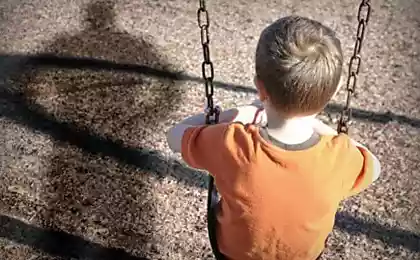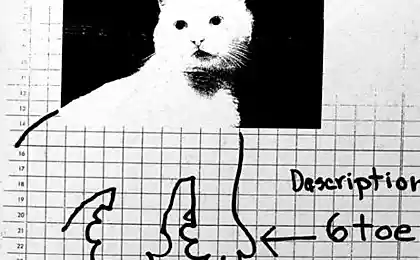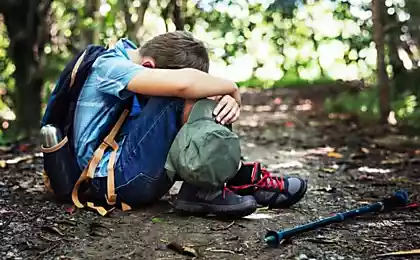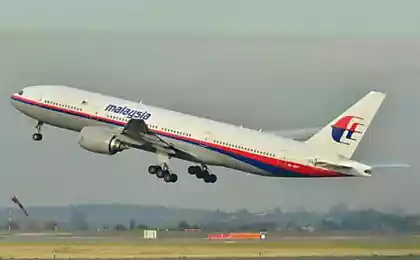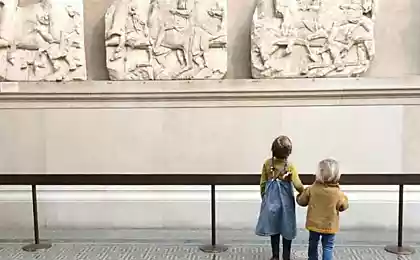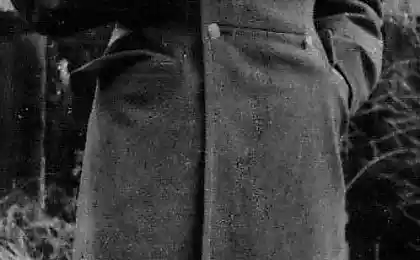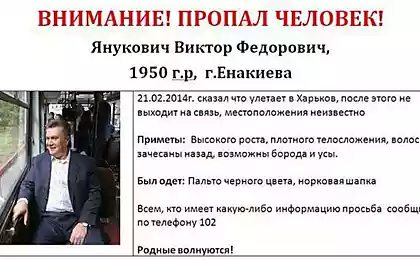791
Missing is not lost
Missing is not lost: the 70th anniversary of the Great Patriotic War.
Three hundred kilometers south of Moscow. Kaluga region, Ulyanovsk district. June heat. In the pine forest tent camp of searchers. There are several teams from different cities - from Kozelsk and Tula to Moscow and Bryansk. Beginning of the next year "Watch's capacity" in places where in 1941-43 were fierce battles with the Germans.
Here, near the village district and seen everywhere on grassy craters from explosions, trenches, whole rows of trenches. In this area were left lying unburied tens of thousands of Red Army soldiers. More than twenty years working in the Ulyanovsk region search parties. This year, the two watch - spring and summer - raised nearly five hundred soldiers who gave their lives for their country.
I arrived at the camp and went to the excavation to where the village is now defunct Zheleznitsa worked searchers from Bryansk, Kozelsk and Mordovia.
On them, and found the burial ceremony of fighters - this report:
Via 42 photo
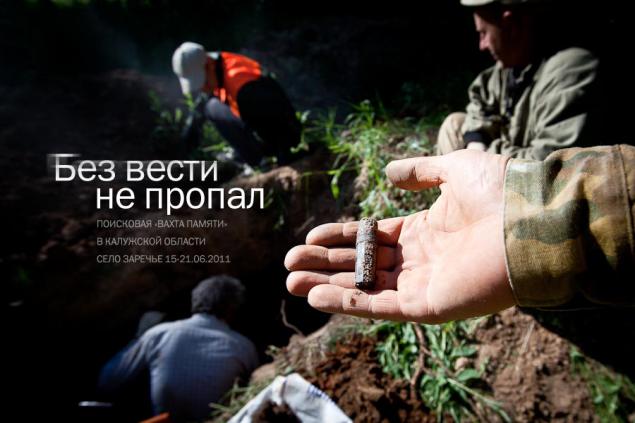
02
At seven in the morning my brothers Parchaykinymi from Saransk - Yura and Volodya - came to this place. There, between two ravines, passed the line of our defense and in the trenches, which are now barely veiled under a layer of earth, lie the remains of soldiers. On the eve of the brothers returned to the camp with nothing and are now eager to "raise a fighter" - so it sounds in the jargon of the search engines. Looking ahead, I will say that Yura and Volodya went all day and only in the evening and they were lucky fighter they still raised.
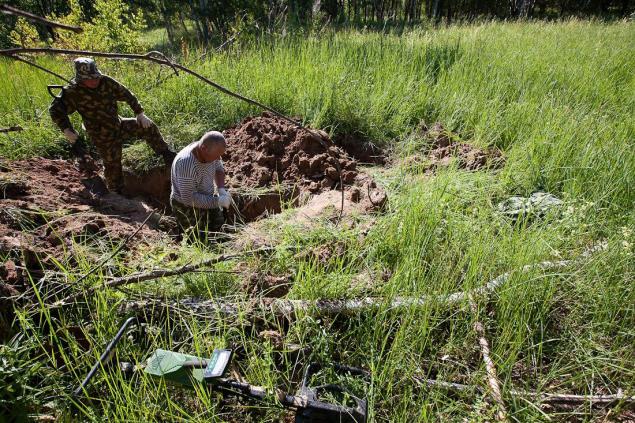
03
All of this with young birch copse with strawberry placers in the thick grass, dug during the previous watches. Where abandoned rusty helmets, were found by soldiers.
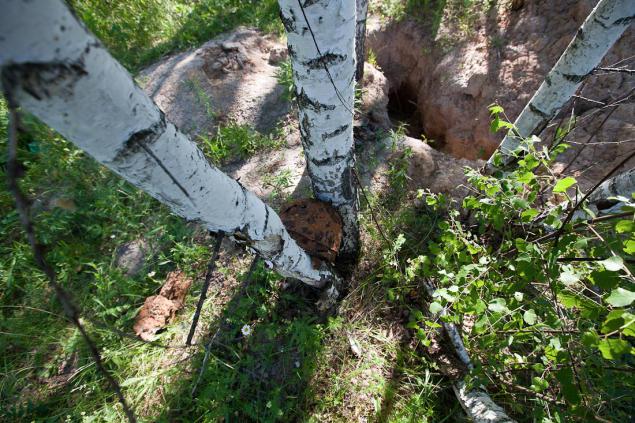
04
I left the brothers, so as not to disturb them, and went to another place of coppice - here digging detachment commander of the Bryansk "Relight" Alexey Biryukov. He was seeking a young age - more than forty years. Finding a metal seat, he began to dig, and when I came to him, had already raised the remains of two fighters. Alex picked up the fragments of bones, skulls, a lot of different utensils soldier, like masks, mugs, penknives. One after another soldier was dug shoes - sturdy American boots quite unworn. And guys, judging by the state of the teeth in the lower jaw were very young.
- Come on, honey, give me a voice - persuaded Alex, digging in the pit, hoping to find something on which there is the name of the soldier. Sometimes they scratch out the names on the cups, spoons, a penknife.
There is nothing.
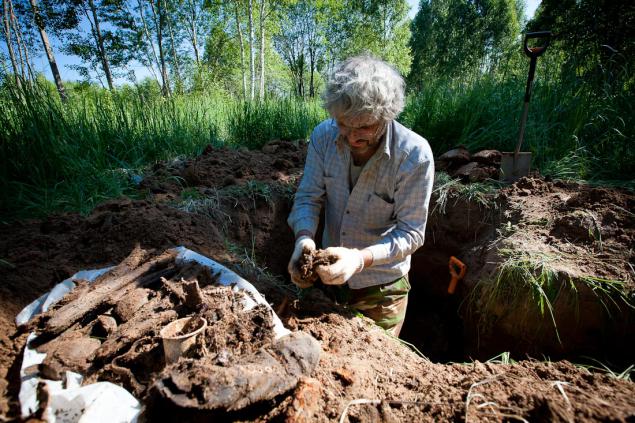
05
In this trench Alex finds the remains of five soldiers of the Red Army.
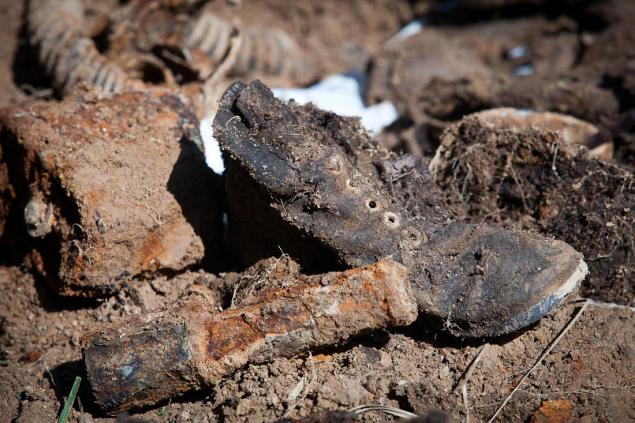
06
Not far from Alexei made his excavation pediatrician from Moscow Dmitry and Artem Roziznany from Kozelsk squad. Dmitri is his seventh field season. When I came to have a special bag lay the remains of a soldier who was in the trenches. Dima found his lighteneth in the land of metal teeth.
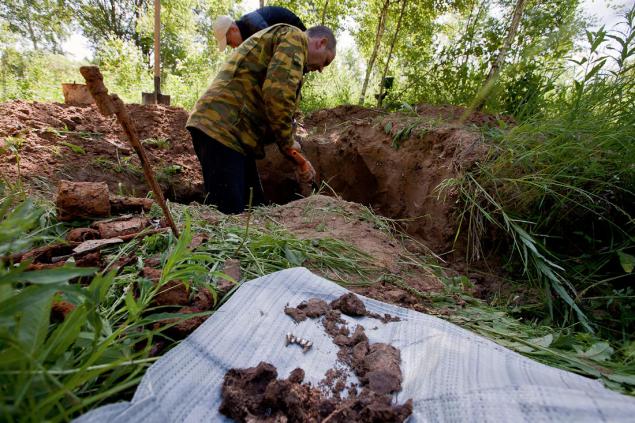
07
This is what lay next to the fallen soldiers: a bayonet from trehlineyki, antitank grenade RPG-40 grenade remainder shompolnye Serdyukov intracavity OPO-41 (the so-called "Serduchka" or "Goodbye, Motherland") - these grenades, shoot with a rifle were made to the spring of 1942 and were retired due to the large number of failures - they blew straight into the shot.
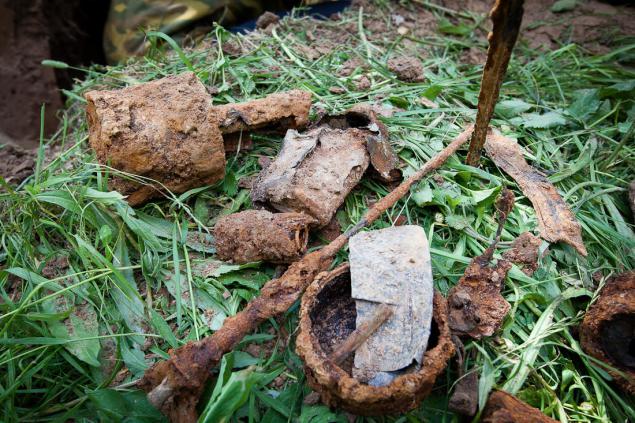
08
Dima has found two soldiers and solid circles: - There should be a second, not leaving until the second found.
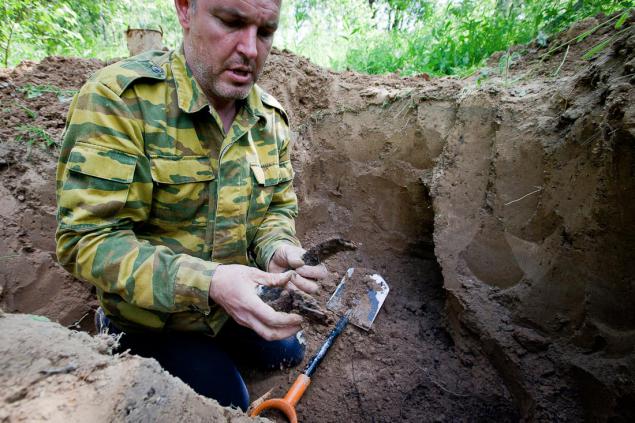
09
Piglet 39-year and the glass ampoule from the penicillin.
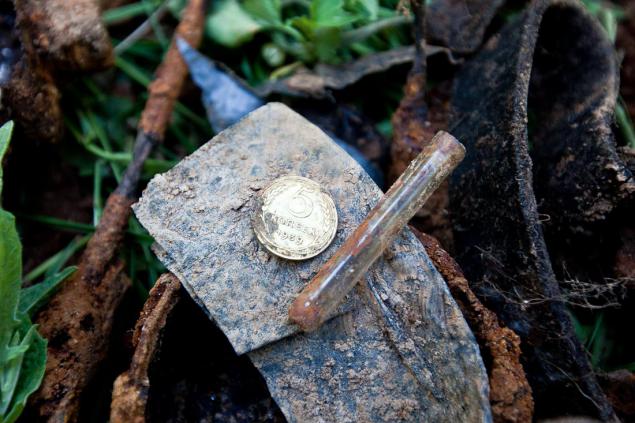
10
Alex and Dima invited to the camp for lunch - they got no where everything and close to the excavations.
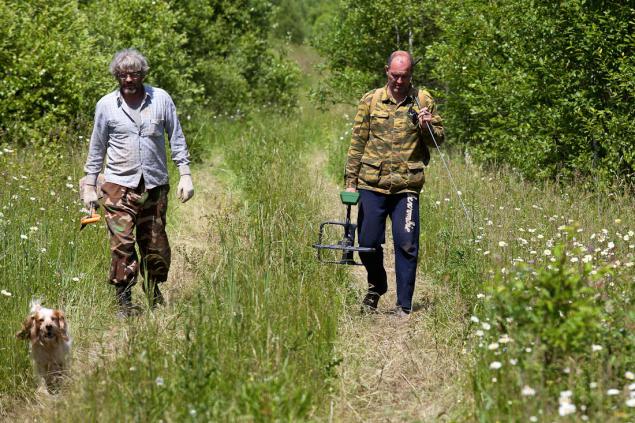
11
Put the pot on the fire, we made pasta with canned meat, drank tea. The camp men have chosen the right - with the wind, drives away evil local mosquitoes. In general, the main attack in the summer watch - mosquitoes and horseflies. What is not smeared all sorts of rubbish, still going up bitten bloody wounds. Spring is easier to work - there are almost no mosquitoes and the ground still soft.
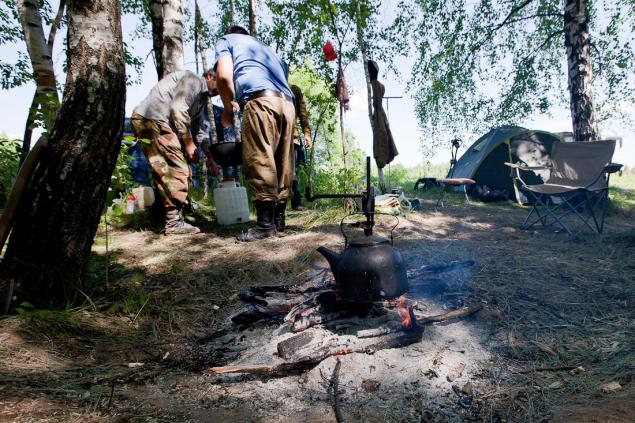
12
Alex came, experienced hand poked probe in different directions, said the dig here. Start digging immediately appeared trehlineyka and helmet. The second soldier was getting closer.
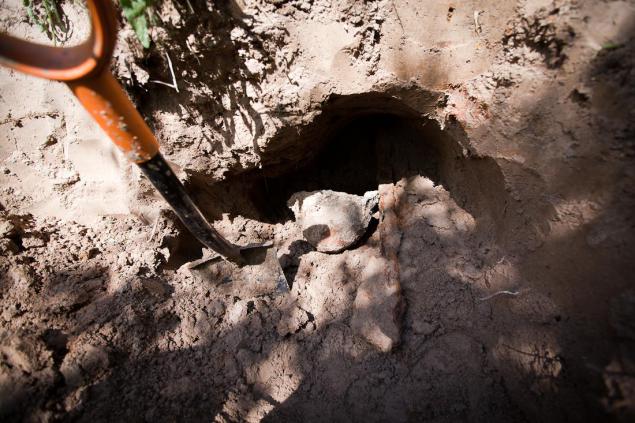
13
We got a second rifle soldier - trehlineyka with fixed bayonet. Apparently, ready to attack.
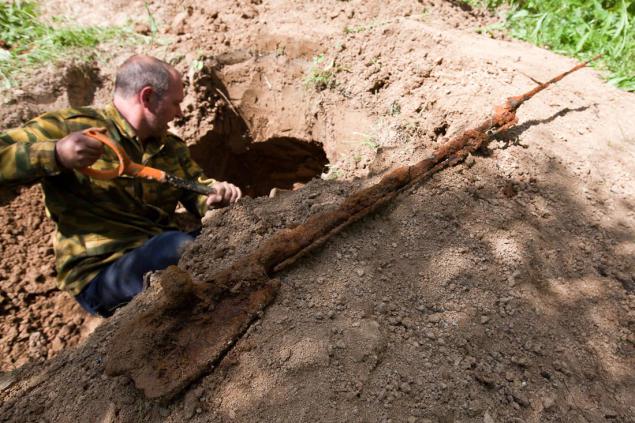
14.
"Mosinka" well preserved. Bayonet as Dima said, "in the trash," and the rest - it is nothing, not even rib still rising. The rifle is charged - the shutter is closed, the cartridge - in the chamber.
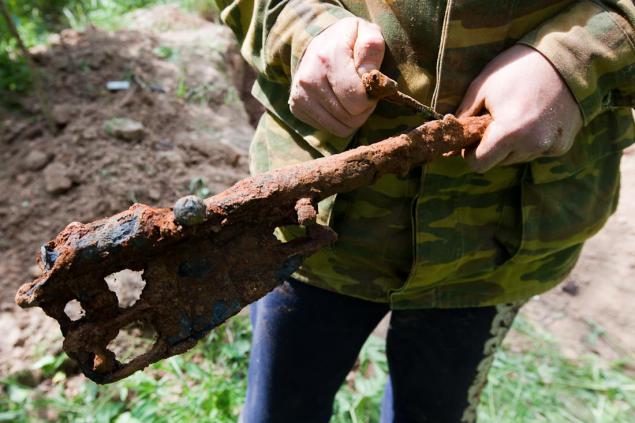
15
Here it is - the second fighter, we found it! I threw it in front of the camera and also took up the shovel, Dima was already at the limit, he dug for five hours.
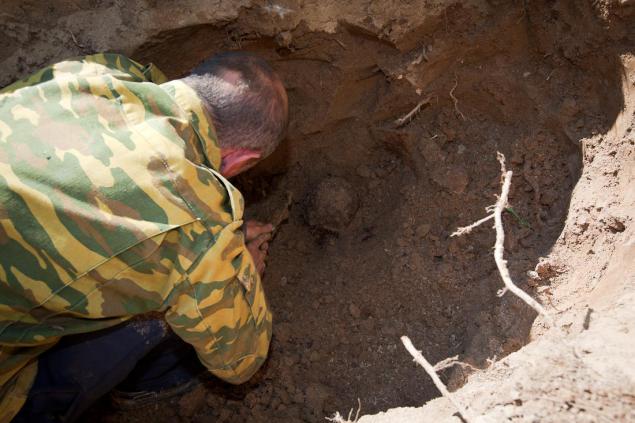
16
Alex gently lays the remains of a skull on the bag remains.
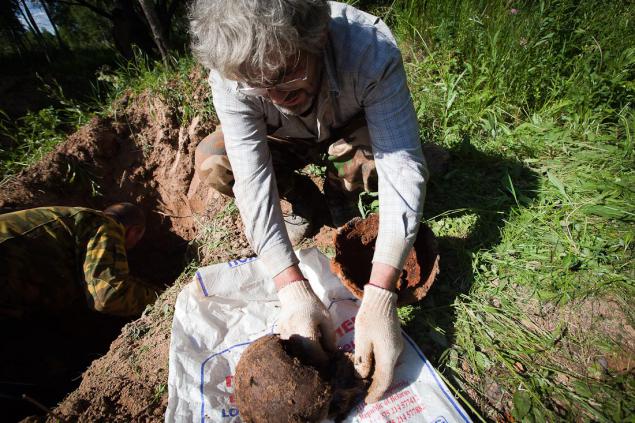
17
I missed this time - moved to change the lens while behind me shouted, "There!". Alex, who succeeded Dima in the trench, the second soldier found the medallion! This is such a moment of truth in the search - to find a medallion with the shape you want to fill it was a soldier: name, surname, patronymic, a residence, data on relatives, recruiting station, blood. They are, as you know a few who fill - a bad omen, and often these medallions are needle and thread or a match. At the end of the 42 th year they were replaced by the Red Army and the book raised after this time the soldiers are not identified at all. The Germans "suicide" had iron tokens of two halves, each of which was stamped with the identification number soldier. Funeral bomber team breaks in two, leaving one killed in the half.
By this time we were joined by Vladimir Matrosov, commander of the "Guardsman" of Kozelsk (right). He here brings school-boys, teaching them search.
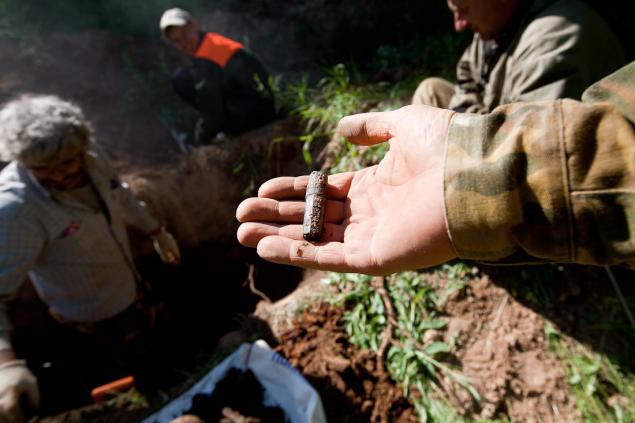
18.
Now all thoughts were only about the medallion. Alex opened it for a second, and we saw that there is not a needle, and rolled-up piece of paper, probably filled with "bomber". Children burned in anti-tol garnet and we went to the camp.
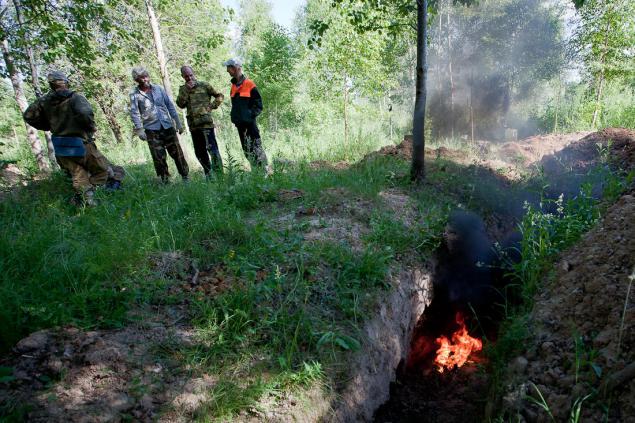
19
In the camp no teas, conversations, jokes. Cleared the table, Alex brought a folder with sheets of paper, needle, tweezers, carefully wiped the little old glasses and began to open the locket.
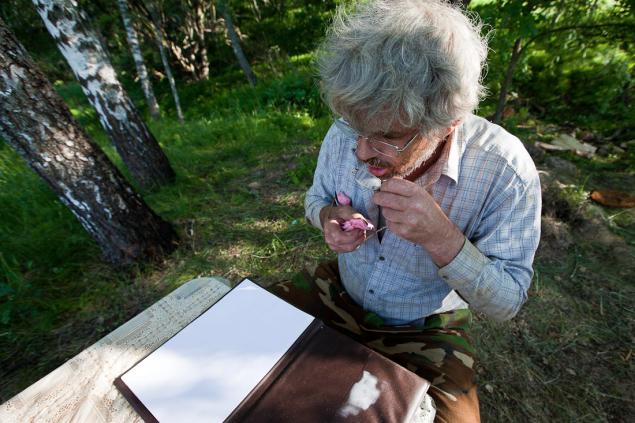
20
The capsule medallion usually collects the water and should be carefully spread on a sheet of wet paper. We immediately saw that the "bomber" is full! Ink blurred, but writing can be read. Millimeter by millimeter twisted leaf opens new line of non-existence, and the soldiers there, which we found today. Last name is read with difficulty, the guys take the time wrong. Dima lihradochno records data on paper, I'm shooting video.
A day later, the head of search teams of the Kaluga region, Sergei Novikov find details found fighters. In the trenches we dug all day, lying junior commander Shamsutdimov Said, born in 1922, native of the village Bakaeva Kuibyshev (now that the borders have changed, Orenburg) region. Minesweeper bomber, according to the documents went missing in 1942. Twenty-year boy died, apparently not immediately - Alex, when he took out the remains showed that he was lying cross-legged, all curled up in pain.
Sergey Novikov already found a distant relative of Said, it even someone remembers. It is said, grew up without a father.
Such a find - always victory for searchers. Another name is returned. He is not missing, this junior commander Shamsutdimov he died a heroic death on the battlefield!
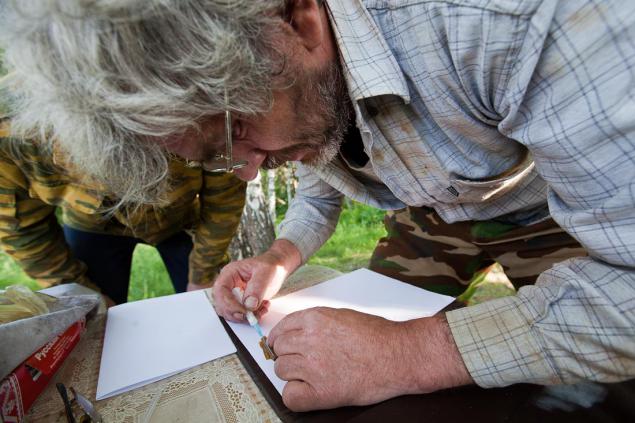
21
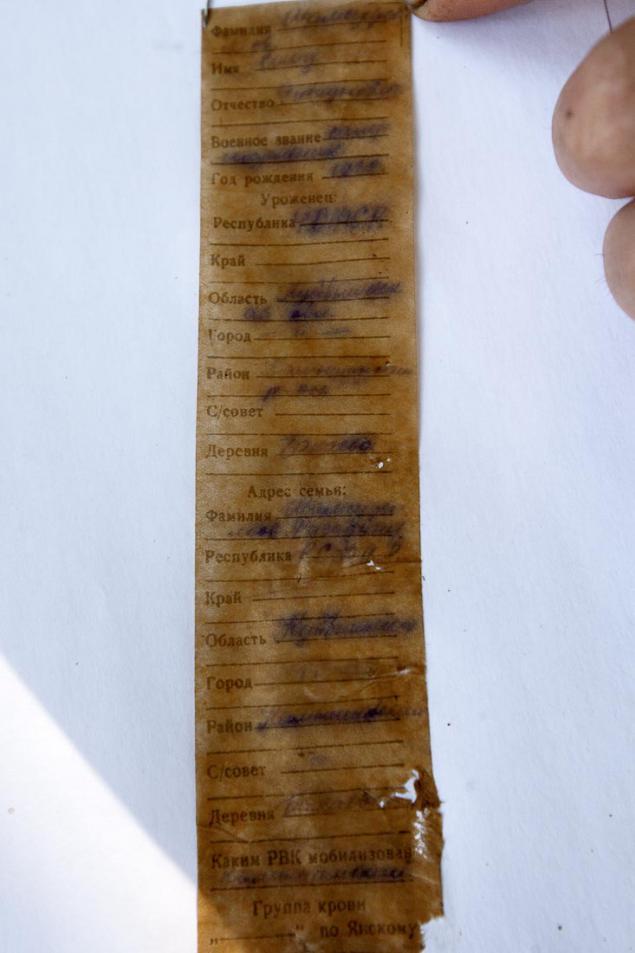
22
Glad we hastily bite left over from lunch pasta. Brothers Yuri and Vladimir, who came after me, too happy, but most of his find - they went a whole day of "their" soldier.
Search Engines - ordinary people are the same as always, and very different. There are all sorts - and those who, dressed in a cool camouflage, do not go into the woods, thumps all day and then slept in a tent, but the majority, of course, real men, obsessed with their noble cause. I really liked at the Bryansk - a single gram of alcohol, no obscene words. People of modest means, spend searching for their own salaries and pensions, save every penny. And raises one soldier after another.
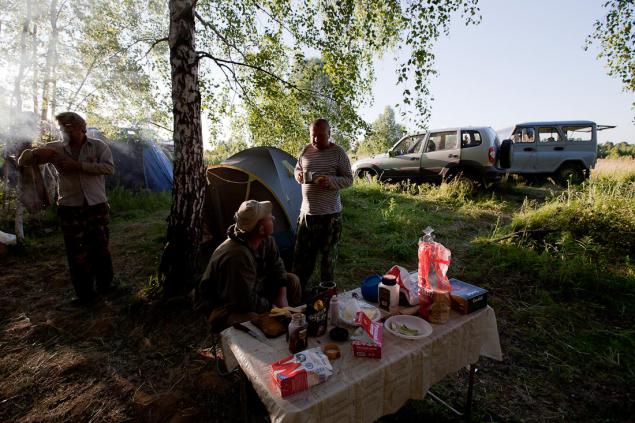
23.
Yesterday, my friend and I went to Peter Lidov solemn burial of the soldiers found during the June "Memory Watch" in the district. During the spring and summer searchers raised 452 Red Army soldiers who died in these places. Next to the military cemetery was dug new mass grave, and at 11 am began the burial ceremony.
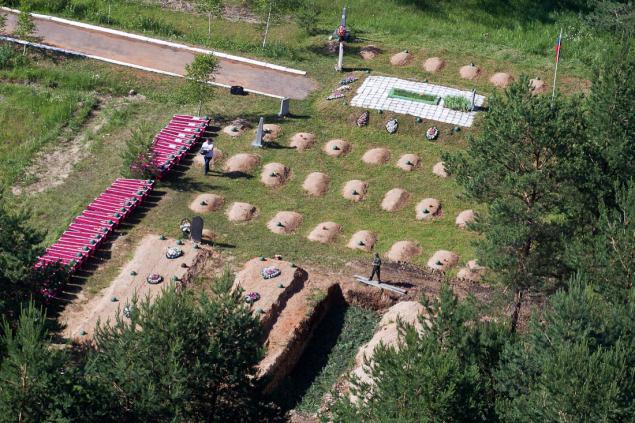
24
We gathered all the search teams that participated in the "Memory Watch".
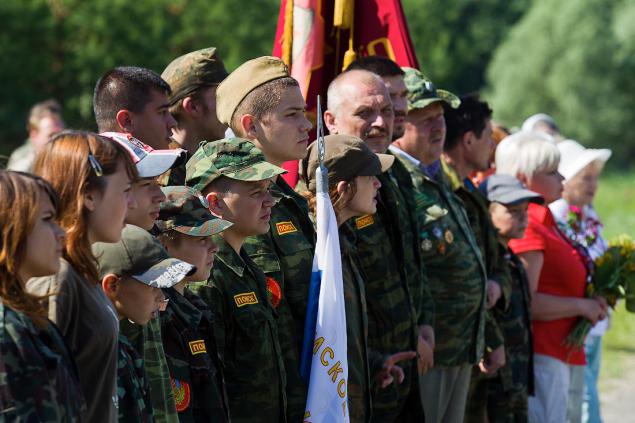
25
Particularly distinguished awarded the main search engine of the Kaluga region Sergey Novikov. That he is not the first organized search operations in these areas. It was he who found the relatives of our sapper-bomber. Amazing man. For me was a great honor to meet him.
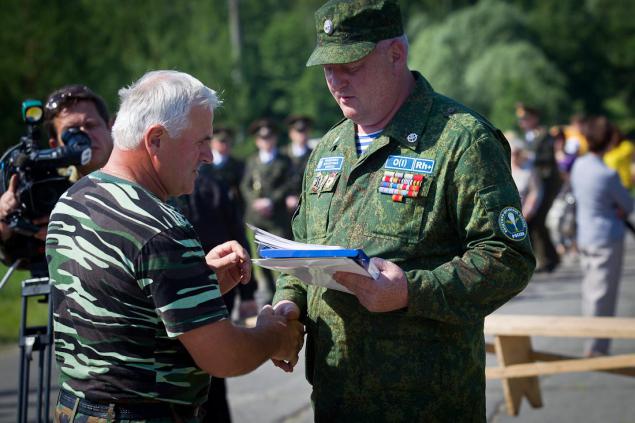
26
Alexander came with her mom, dad and a bouquet of white carnations.
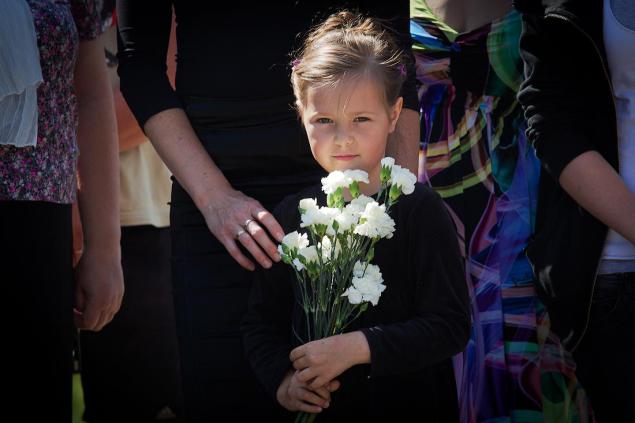
27
Thank Kozelsk division commander, he still gave the soldiers for guard and ceremonial salute.
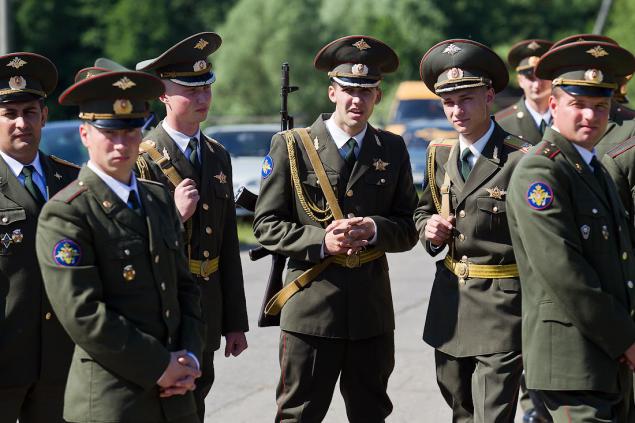
28
The remains of the fallen soldiers were laid in coffins.
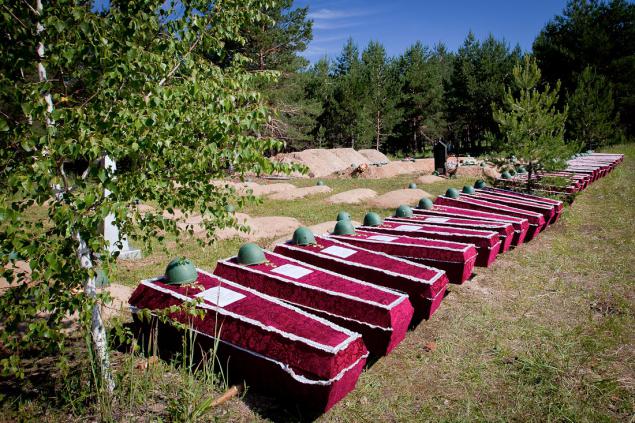
29
For the funeral came priests and monks of the Tikhvin desert.
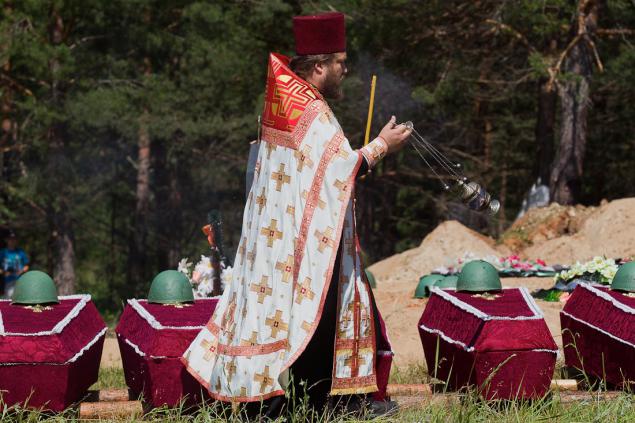
30
On the graves of soldiers who are here already, put the candle.
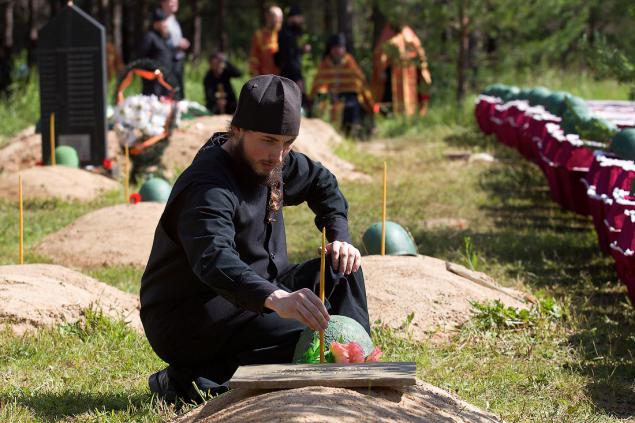
31
Out of the district and came Ulyanovo locals.
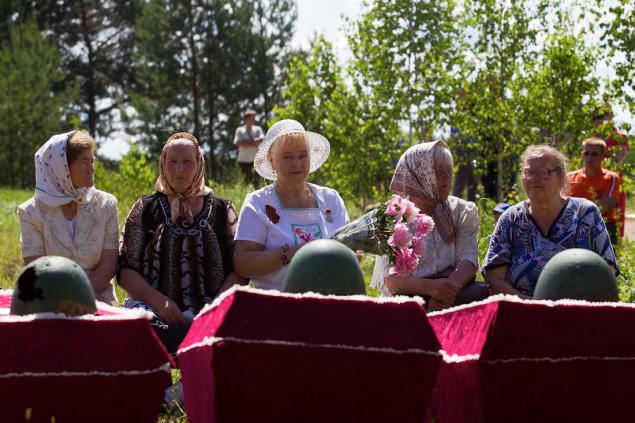
32
Banner search teams.
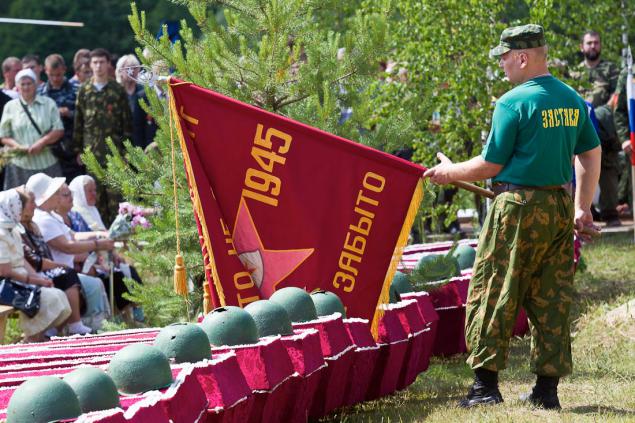
33
Mamontov Rodin - platoon commander of 76-mm divisional guns. Born in the Ulyanovsk region. He finished the war in Berlin.
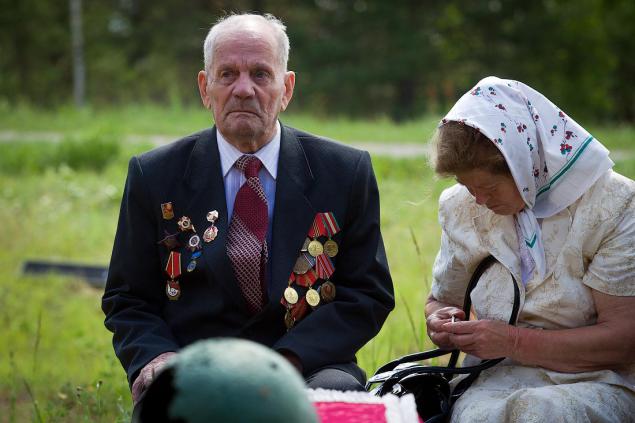
34
Arrived holy fathers were just wonderful. Served earnestly, with a sense of the monks sang heartily, and then Father Alexander said very good words for all the participants.
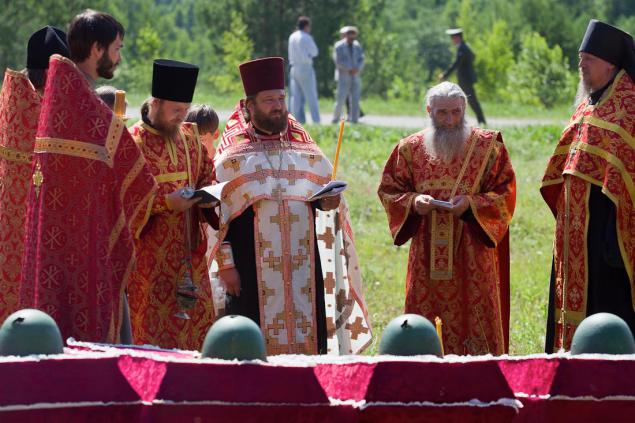
35
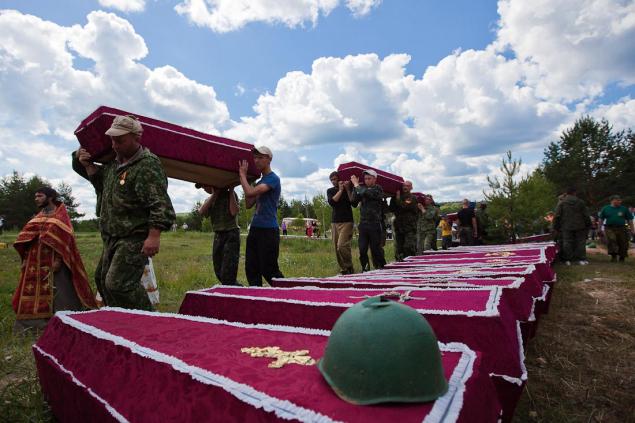
36
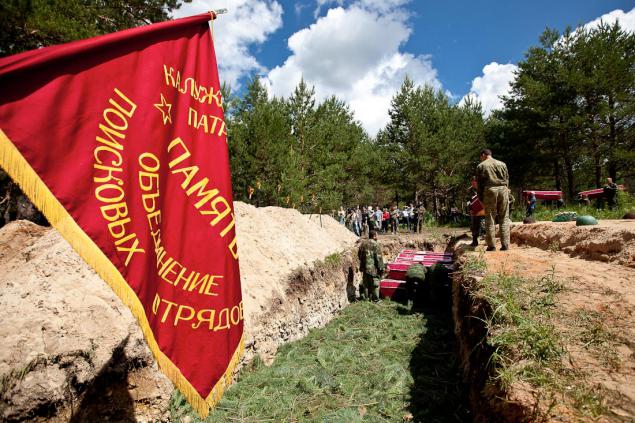
37
Jura Pachaykin, the elder of the two "Saransk" brothers. When we arrived in the morning, Yura immediately pleased, showing his new discovery - they Volodya raised soldier with a unique handwriting medallion. A soldier does not leave his name out of superstition. But after his father had already found. Fallen in a battle called Kirill Sergeyev.
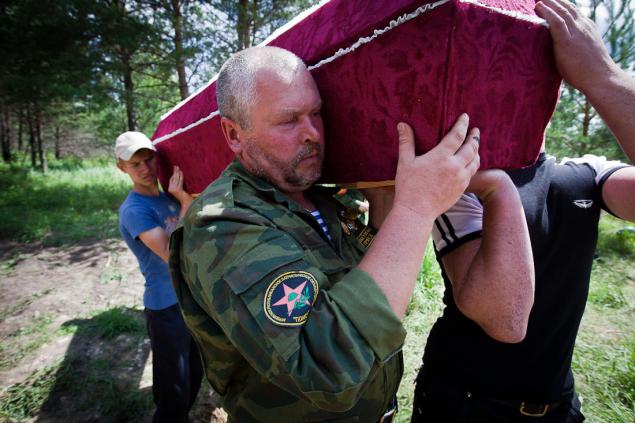
38
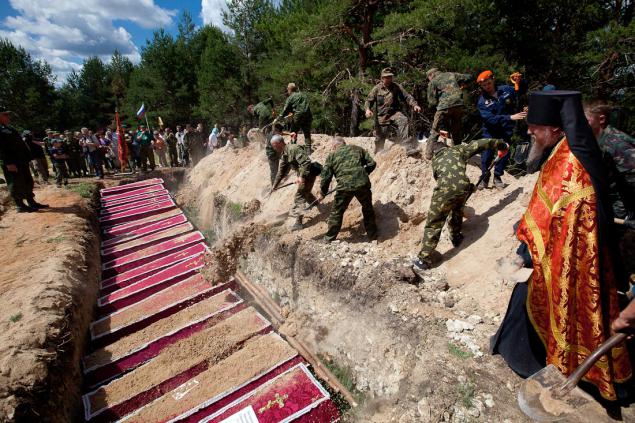
39
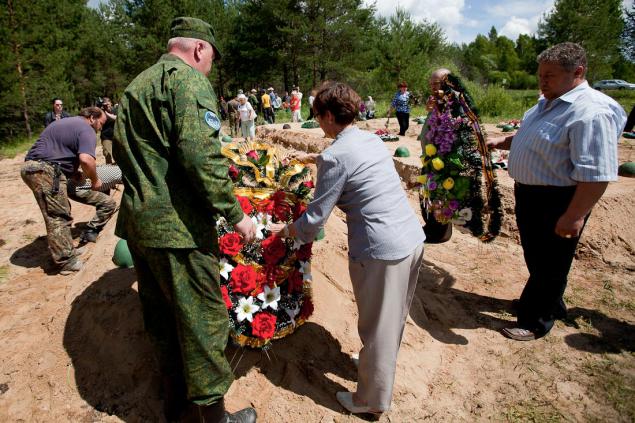
40
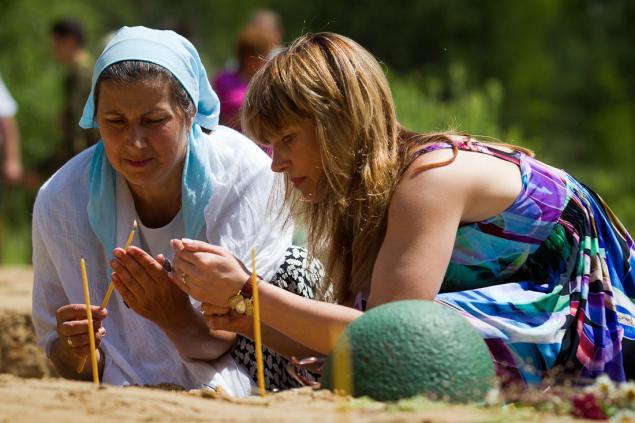
41
Thanks to search engines from the Veterans Committee.
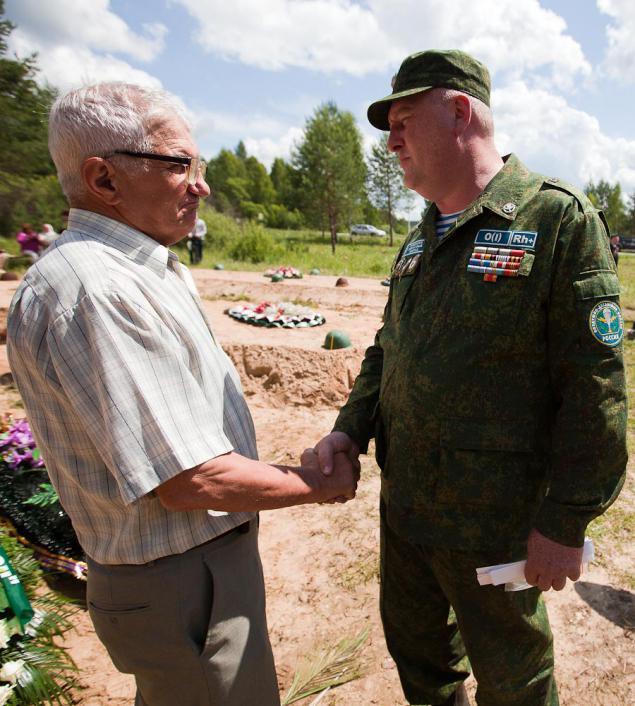
42
For all table was set with a simple soldier's meal.
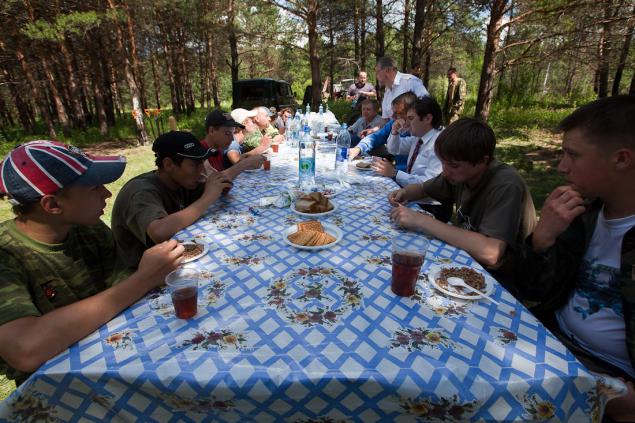
Source:
Three hundred kilometers south of Moscow. Kaluga region, Ulyanovsk district. June heat. In the pine forest tent camp of searchers. There are several teams from different cities - from Kozelsk and Tula to Moscow and Bryansk. Beginning of the next year "Watch's capacity" in places where in 1941-43 were fierce battles with the Germans.
Here, near the village district and seen everywhere on grassy craters from explosions, trenches, whole rows of trenches. In this area were left lying unburied tens of thousands of Red Army soldiers. More than twenty years working in the Ulyanovsk region search parties. This year, the two watch - spring and summer - raised nearly five hundred soldiers who gave their lives for their country.
I arrived at the camp and went to the excavation to where the village is now defunct Zheleznitsa worked searchers from Bryansk, Kozelsk and Mordovia.
On them, and found the burial ceremony of fighters - this report:
Via 42 photo

02
At seven in the morning my brothers Parchaykinymi from Saransk - Yura and Volodya - came to this place. There, between two ravines, passed the line of our defense and in the trenches, which are now barely veiled under a layer of earth, lie the remains of soldiers. On the eve of the brothers returned to the camp with nothing and are now eager to "raise a fighter" - so it sounds in the jargon of the search engines. Looking ahead, I will say that Yura and Volodya went all day and only in the evening and they were lucky fighter they still raised.

03
All of this with young birch copse with strawberry placers in the thick grass, dug during the previous watches. Where abandoned rusty helmets, were found by soldiers.

04
I left the brothers, so as not to disturb them, and went to another place of coppice - here digging detachment commander of the Bryansk "Relight" Alexey Biryukov. He was seeking a young age - more than forty years. Finding a metal seat, he began to dig, and when I came to him, had already raised the remains of two fighters. Alex picked up the fragments of bones, skulls, a lot of different utensils soldier, like masks, mugs, penknives. One after another soldier was dug shoes - sturdy American boots quite unworn. And guys, judging by the state of the teeth in the lower jaw were very young.
- Come on, honey, give me a voice - persuaded Alex, digging in the pit, hoping to find something on which there is the name of the soldier. Sometimes they scratch out the names on the cups, spoons, a penknife.
There is nothing.

05
In this trench Alex finds the remains of five soldiers of the Red Army.

06
Not far from Alexei made his excavation pediatrician from Moscow Dmitry and Artem Roziznany from Kozelsk squad. Dmitri is his seventh field season. When I came to have a special bag lay the remains of a soldier who was in the trenches. Dima found his lighteneth in the land of metal teeth.

07
This is what lay next to the fallen soldiers: a bayonet from trehlineyki, antitank grenade RPG-40 grenade remainder shompolnye Serdyukov intracavity OPO-41 (the so-called "Serduchka" or "Goodbye, Motherland") - these grenades, shoot with a rifle were made to the spring of 1942 and were retired due to the large number of failures - they blew straight into the shot.

08
Dima has found two soldiers and solid circles: - There should be a second, not leaving until the second found.

09
Piglet 39-year and the glass ampoule from the penicillin.

10
Alex and Dima invited to the camp for lunch - they got no where everything and close to the excavations.

11
Put the pot on the fire, we made pasta with canned meat, drank tea. The camp men have chosen the right - with the wind, drives away evil local mosquitoes. In general, the main attack in the summer watch - mosquitoes and horseflies. What is not smeared all sorts of rubbish, still going up bitten bloody wounds. Spring is easier to work - there are almost no mosquitoes and the ground still soft.

12
Alex came, experienced hand poked probe in different directions, said the dig here. Start digging immediately appeared trehlineyka and helmet. The second soldier was getting closer.

13
We got a second rifle soldier - trehlineyka with fixed bayonet. Apparently, ready to attack.

14.
"Mosinka" well preserved. Bayonet as Dima said, "in the trash," and the rest - it is nothing, not even rib still rising. The rifle is charged - the shutter is closed, the cartridge - in the chamber.

15
Here it is - the second fighter, we found it! I threw it in front of the camera and also took up the shovel, Dima was already at the limit, he dug for five hours.

16
Alex gently lays the remains of a skull on the bag remains.

17
I missed this time - moved to change the lens while behind me shouted, "There!". Alex, who succeeded Dima in the trench, the second soldier found the medallion! This is such a moment of truth in the search - to find a medallion with the shape you want to fill it was a soldier: name, surname, patronymic, a residence, data on relatives, recruiting station, blood. They are, as you know a few who fill - a bad omen, and often these medallions are needle and thread or a match. At the end of the 42 th year they were replaced by the Red Army and the book raised after this time the soldiers are not identified at all. The Germans "suicide" had iron tokens of two halves, each of which was stamped with the identification number soldier. Funeral bomber team breaks in two, leaving one killed in the half.
By this time we were joined by Vladimir Matrosov, commander of the "Guardsman" of Kozelsk (right). He here brings school-boys, teaching them search.

18.
Now all thoughts were only about the medallion. Alex opened it for a second, and we saw that there is not a needle, and rolled-up piece of paper, probably filled with "bomber". Children burned in anti-tol garnet and we went to the camp.

19
In the camp no teas, conversations, jokes. Cleared the table, Alex brought a folder with sheets of paper, needle, tweezers, carefully wiped the little old glasses and began to open the locket.

20
The capsule medallion usually collects the water and should be carefully spread on a sheet of wet paper. We immediately saw that the "bomber" is full! Ink blurred, but writing can be read. Millimeter by millimeter twisted leaf opens new line of non-existence, and the soldiers there, which we found today. Last name is read with difficulty, the guys take the time wrong. Dima lihradochno records data on paper, I'm shooting video.
A day later, the head of search teams of the Kaluga region, Sergei Novikov find details found fighters. In the trenches we dug all day, lying junior commander Shamsutdimov Said, born in 1922, native of the village Bakaeva Kuibyshev (now that the borders have changed, Orenburg) region. Minesweeper bomber, according to the documents went missing in 1942. Twenty-year boy died, apparently not immediately - Alex, when he took out the remains showed that he was lying cross-legged, all curled up in pain.
Sergey Novikov already found a distant relative of Said, it even someone remembers. It is said, grew up without a father.
Such a find - always victory for searchers. Another name is returned. He is not missing, this junior commander Shamsutdimov he died a heroic death on the battlefield!

21

22
Glad we hastily bite left over from lunch pasta. Brothers Yuri and Vladimir, who came after me, too happy, but most of his find - they went a whole day of "their" soldier.
Search Engines - ordinary people are the same as always, and very different. There are all sorts - and those who, dressed in a cool camouflage, do not go into the woods, thumps all day and then slept in a tent, but the majority, of course, real men, obsessed with their noble cause. I really liked at the Bryansk - a single gram of alcohol, no obscene words. People of modest means, spend searching for their own salaries and pensions, save every penny. And raises one soldier after another.

23.
Yesterday, my friend and I went to Peter Lidov solemn burial of the soldiers found during the June "Memory Watch" in the district. During the spring and summer searchers raised 452 Red Army soldiers who died in these places. Next to the military cemetery was dug new mass grave, and at 11 am began the burial ceremony.

24
We gathered all the search teams that participated in the "Memory Watch".

25
Particularly distinguished awarded the main search engine of the Kaluga region Sergey Novikov. That he is not the first organized search operations in these areas. It was he who found the relatives of our sapper-bomber. Amazing man. For me was a great honor to meet him.

26
Alexander came with her mom, dad and a bouquet of white carnations.

27
Thank Kozelsk division commander, he still gave the soldiers for guard and ceremonial salute.

28
The remains of the fallen soldiers were laid in coffins.

29
For the funeral came priests and monks of the Tikhvin desert.

30
On the graves of soldiers who are here already, put the candle.

31
Out of the district and came Ulyanovo locals.

32
Banner search teams.

33
Mamontov Rodin - platoon commander of 76-mm divisional guns. Born in the Ulyanovsk region. He finished the war in Berlin.

34
Arrived holy fathers were just wonderful. Served earnestly, with a sense of the monks sang heartily, and then Father Alexander said very good words for all the participants.

35

36

37
Jura Pachaykin, the elder of the two "Saransk" brothers. When we arrived in the morning, Yura immediately pleased, showing his new discovery - they Volodya raised soldier with a unique handwriting medallion. A soldier does not leave his name out of superstition. But after his father had already found. Fallen in a battle called Kirill Sergeyev.

38

39

40

41
Thanks to search engines from the Veterans Committee.

42
For all table was set with a simple soldier's meal.

Source:



